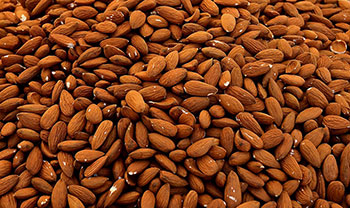 Almond Description & Health Benefits
Almond Description & Health Benefits
- Almond is a member of the Rosaceae botanical family which includes apples, pears, apricots, plum, cherries, peaches, blackberries, raspberries, and strawberries along with numerous trees and shrubs.
- Almonds are an excellent source of vitamin E and manganese and a good source of fiber, protein, riboflavin, magnesium, phosphorus, and copper.
- Vitamin E acts like an antioxidant protecting the body from free radicals which increase your risk of cardiovascular disease and cancer. Vitamin E is also involved in immune function and regulation of gene expression.
- Manganese helps the body form connective tissue and bones while also playing a role in calcium absorption and the metabolism of fats and carbohydrates.
- Fiber aids in digestion and benefits weight management due to its effect of making you feel full faster, reducing the amount of calories consumed.
- Protein is essential for building bones, muscles, cartilage, skin, and blood. It is very important to the growth and development of infants and children.
- Riboflavin is important for growth and red blood cell formation.
- Magnesium controls muscle and nerve function, blood sugar levels, and blood pressure.
- Phosphorus assists in the formation of bones and teeth, maintenance and repair of cells and tissues and works with the B vitamins to support kidney function.
- Copper works with iron to form red blood cells, while it also aids in the absorption of iron.
- Almonds also contain antioxidants which are associated with cholesterol-lowering properties.
Purchasing, Selecting, Storing, and Preparing
- Purchase pre-packaged or in the bulk department of a grocery store. Almonds will be sold whole, sliced, or slivered; raw, blanched, or roasted. Almonds can also be purchased as a flour or butter.
- Blanched almonds are those with their skins removed. To blanch almonds they are briefly soaked in boiling water, drained, rinsed with cold water and drained again. Once patted dry, the skin of the almond should easily be removed.
- Store almonds in an airtight container in a dark, cool place for 2 years if unopened or 1 year if open. If kept in the refrigerator or freezer they will last longer.
Nutrition Facts
1/4 cup whole raw almonds
Calories: 160 | Protein: 6.0 g | Fat: 14.0 g | Carbohydrate: 6.0 g | Fiber: 3.0 g | Calcium: 73.9 mg | Magnesium: 75 mg | Potassium: 197 mg | Vitamin C: 0.0 mg | Folate: 14 µg | Vitamin A: 0.0
ndb.nal.usda.gov
Recipes
Request an Appointment
